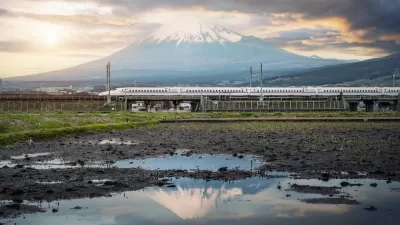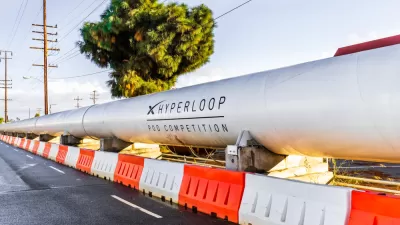We hear a lot about the next leap forward in transportation, whether it be Elon Musk's Hyperloop or Tel Aviv's floating pods. But in focusing on the latest fantasy, are we harming our ability to address the problems of the present?
"History is full of examples of the next great transport idea," writes Eric Jaffe. "Today it's the floating pod, yesterday it was Elon Musk's Hyperloop, last year it was intercontinental airless tubes, back in 1908 it was Thomas Edison 'perfecting' the electric car battery, and so on."
"But the truth is transportation has very rarely changed with a great deal of speed or spectacle," he contends. "The past is witness to mobility's incremental transformations."
"Psychologists have studied the human tendency toward fantasy, and they've found that imagining a crisply rendered future has the unintended effect of dampening our motivation to achieve it," Jaffe explains. "By editing out the 'obstacles, problems, and setbacks' we'll face en route to that goal, our fantasized futures might actually frustrate any real progress, as work from Gabriele Oettingen of New York University has found [PDF]."
"In other words, we're far better off with good expectations than great fantasies."
FULL STORY: Let's All Stop Obsessing About the 'Next Great Thing' in Urban Transportation

Planetizen Federal Action Tracker
A weekly monitor of how Trump’s orders and actions are impacting planners and planning in America.

Restaurant Patios Were a Pandemic Win — Why Were They so Hard to Keep?
Social distancing requirements and changes in travel patterns prompted cities to pilot new uses for street and sidewalk space. Then it got complicated.

Maui's Vacation Rental Debate Turns Ugly
Verbal attacks, misinformation campaigns and fistfights plague a high-stakes debate to convert thousands of vacation rentals into long-term housing.

In California Battle of Housing vs. Environment, Housing Just Won
A new state law significantly limits the power of CEQA, an environmental review law that served as a powerful tool for blocking new development.

Boulder Eliminates Parking Minimums Citywide
Officials estimate the cost of building a single underground parking space at up to $100,000.

Orange County, Florida Adopts Largest US “Sprawl Repair” Code
The ‘Orange Code’ seeks to rectify decades of sprawl-inducing, car-oriented development.
Urban Design for Planners 1: Software Tools
This six-course series explores essential urban design concepts using open source software and equips planners with the tools they need to participate fully in the urban design process.
Planning for Universal Design
Learn the tools for implementing Universal Design in planning regulations.
Heyer Gruel & Associates PA
JM Goldson LLC
Custer County Colorado
City of Camden Redevelopment Agency
City of Astoria
Transportation Research & Education Center (TREC) at Portland State University
Jefferson Parish Government
Camden Redevelopment Agency
City of Claremont




























